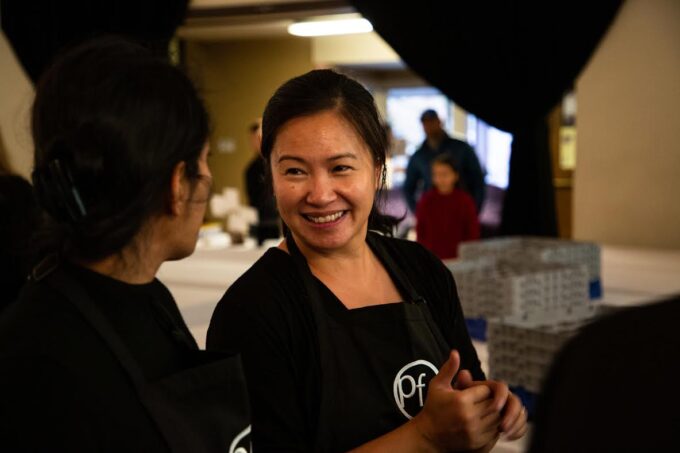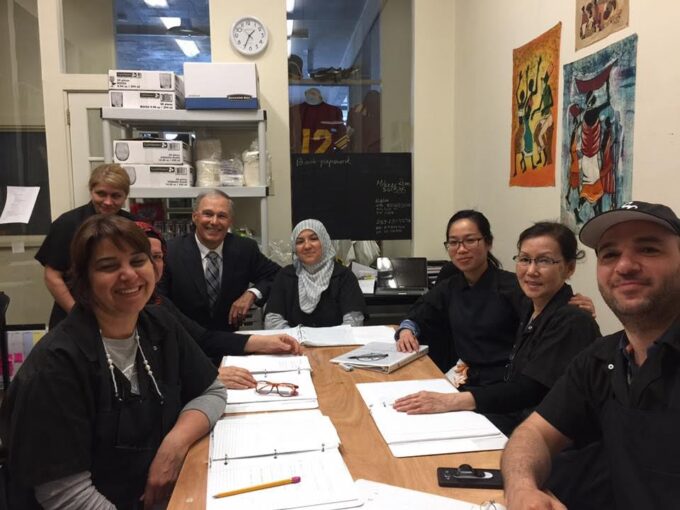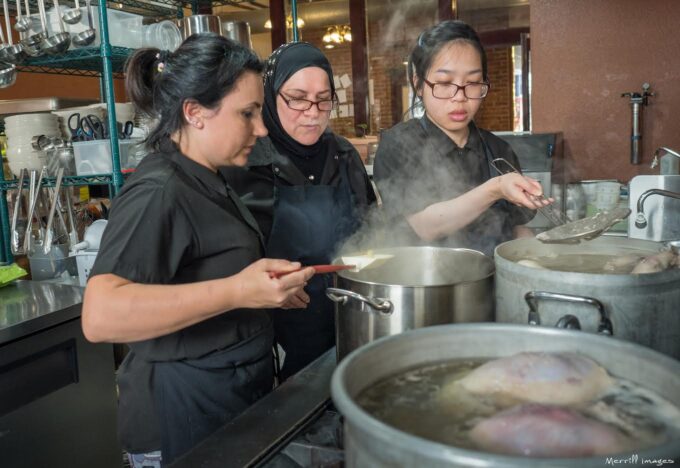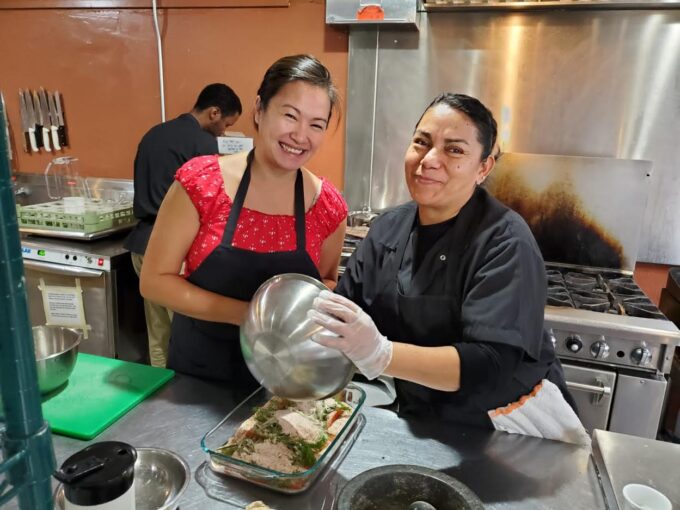Inbox

What is Project Feast’s mission?
Our mission is to provide culinary training to low-income immigrants and refugees so that they can pursue a livelihood in the food industry. Project Feast provides them a platform to share their stories and cuisine with the community.
How long has you served as ED?
I started this position in September 2019, succeeding our founder, Veena Prasad, who was stepping down after 7 years.
Why did you take on this job?
It was an opportunity to support a community I love—immigrants and refugees. Meeting the immigrants and refugees in our programs and hearing their stories make me think of my parents and the challenges they faced when they first came to the US. These are not new barriers—learning English, finding a job, adapting to a different culture, building a new home. These are challenges immigrants have faced throughout time. My family was fortunate as we had basically a whole community supporting us when we arrived to the US. I know of many families who did not have this support and access to the resources that we were provided. I feel grateful for this opportunity to provide support to the next generation of immigrants. Plus, I get to cook and eat, two of my favorite past times.

What is your background?
I have a BA in Art History from Tulane University and an MA in Asian Studies from the University of Hawaii. My professional background is in education administration and outreach. I’ve worked at universities, K-12 institutions, as well as at private organizations. I’ve had the opportunity to lead educational tours for teachers in Vietnam, as well as to develop cultural programs for all ages.
What is your family’s Vietnamese story? (When did you come over, how, did anyone serve in the military?)
My family left Vietnam in 1979—amongst what is known as the 2nd wave of boat people. It was my parents, my 18 month-old sister and myself (3 years old at the time). My parents snuck out of the house at night—they didn’t even say good bye to my Ba Noi as they were afraid she would insist her grandkids stay in Vietnam with her. We ended up at a refugee camp in Thailand. After about 6 months, we were fortunate to be sponsored by a church in Grand Rapids, MI who was looking for a family to host. They provided us with a house and enrolled my parents in ESL classes where they were able to meet other Vietnamese refugees.
My father was in the military—he actually ran away from home to join at the age of 14 (he lied about his age in order to join the army). He doesn’t talk about it much, but I know that he still keeps in touch with his military friends.

How many people does your PF serve? How many Vietnamese?
We train approximately 8 – 12 apprentices a year. Additionally, we have started a transitional employment program where we hire on 1-2 recent alumni for up to 1 year. And, of course, we offer continual support to our alumni with small business consultation, kitchen incubation, and contracted work. I believe we’ve only had 2 Vietnamese apprentices in our program—a mother and daughter who went through our program in 2017. We would love to have more Vietnamese apprentices so send them our way if you think they would benefit from our program!

Also, with the start of the pandemic, we have been providing free meals to food insecure immigrant families and seniors. Since April. We’ve served over 10,000 meals through partner organizations.
How many people buy the family meals?
Currently, we offer a family meal once a week. Each week is a different meal inspired by past and present apprentices and staff. The menu is posted on Fridays and we accept orders until the following Tuesday (or until we sell out, whichever comes first). Lately, we’ve been selling about 30-40 meals a week, which is approximately 100 – 120 people (meals are packed for 2 or 4 people)
How do you reach out to people?
We have a weekly newsletter and we also post on social media. A lot of it is through word of mouth. You can subscribe to our newsletter on our website: https://projectfeast.org/
Or go directly to our online order page: https://project-feast-2.square.site/
What does PF need most right now?
We’ve been grateful for all the support from our community. Our fundraising efforts in 2020 surpassed our expectations—and we even managed to purchase a new range recently! With that said, as a small non-profit, we are often overlooked for funding as funders look for opportunities to “maximize” their dollars which usually means giving money to organizations that will impact the highest number of people. We are only able to train 8-12 apprentices per year. However, if you look at the ripple effect, these apprentices return to their communities to do outreach, to work, and to start businesses that support their local economy. While we can’t quantify this impact, we know that we are doing important work towards providing social and economic justice for the immigrant community.
As a non-profit, we depend on grants. As a social venture, we need customers and community support.
How is PF weathering the pandemic?
We are doing okay. It was rocky at first as we had to close our dining room and all of our catering orders were cancelled (80% of our sales were dependent on catering). While our dine-in service is still closed, our Family Meals have proven to be a surprising hit. We hope to continue this take-out option as catering slowly starts coming back. We have also received funding to support our Community Meals program so we hope to be able to continue providing these free meals to people in need.
What is Project Feast’s mission?
Our mission is to provide culinary training to low-income immigrants and refugees so that they can pursue a livelihood in the food industry. Project Feast provides them a platform to share their stories and cuisine with the community.
How long has you served as ED?
I started this position in September 2019, succeeding our founder, Veena Prasad, who was stepping down after 7 years.
Why did you take on this job?
It was an opportunity to support a community I love—immigrants and refugees. Meeting the immigrants and refugees in our programs and hearing their stories make me think of my parents and the challenges they faced when they first came to the US. These are not new barriers—learning English, finding a job, adapting to a different culture, building a new home. These are challenges immigrants have faced throughout time. My family was fortunate as we had basically a whole community supporting us when we arrived to the US. I know of many families who did not have this support and access to the resources that we were provided. I feel grateful for this opportunity to provide support to the next generation of immigrants. Plus, I get to cook and eat, two of my favorite past times.
What is your background?
I have a BA in Art History from Tulane University and an MA in Asian Studies from the University of Hawaii. My professional background is in education administration and outreach. I’ve worked at universities, K-12 institutions, as well as at private organizations. I’ve had the opportunity to lead educational tours for teachers in Vietnam, as well as to develop cultural programs for all ages.
What is your family’s Vietnamese story? (When did you come over, how, did anyone serve in the military?)
My family left Vietnam in 1979—amongst what is known as the 2nd wave of boat people. It was my parents, my 18 month-old sister and myself (3 years old at the time). My parents snuck out of the house at night—they didn’t even say good bye to my Ba Noi as they were afraid she would insist her grandkids stay in Vietnam with her. We ended up at a refugee camp in Thailand. After about 6 months, we were fortunate to be sponsored by a church in Grand Rapids, MI who was looking for a family to host. They provided us with a house and enrolled my parents in ESL classes where they were able to meet other Vietnamese refugees.
My father was in the military—he actually ran away from home to join at the age of 14 (he lied about his age in order to join the army). He doesn’t talk about it much, but I know that he still keeps in touch with his military friends.
How many people does your PF serve? How many Vietnamese?
We train approximately 8 – 12 apprentices a year. Additionally, we have started a transitional employment program where we hire on 1-2 recent alumni for up to 1 year. And, of course, we offer continual support to our alumni with small business consultation, kitchen incubation, and contracted work. I believe we’ve only had 2 Vietnamese apprentices in our program—a mother and daughter who went through our program in 2017. We would love to have more Vietnamese apprentices so send them our way if you think they would benefit from our program!
Also, with the start of the pandemic, we have been providing free meals to food insecure immigrant families and seniors. Since April. We’ve served over 10,000 meals through partner organizations.
How many people buy the family meals?
Currently, we offer a family meal once a week. Each week is a different meal inspired by past and present apprentices and staff. The menu is posted on Fridays and we accept orders until the following Tuesday (or until we sell out, whichever comes first). Lately, we’ve been selling about 30-40 meals a week, which is approximately 100 – 120 people (meals are packed for 2 or 4 people)
How do you reach out to people?
We have a weekly newsletter and we also post on social media. A lot of it is through word of mouth. You can subscribe to our newsletter on our website: https://projectfeast.org/
Or go directly to our online order page: https://project-feast-2.square.site/
What does PF need most right now?
We’ve been grateful for all the support from our community. Our fundraising efforts in 2020 surpassed our expectations—and we even managed to purchase a new range recently! With that said, as a small non-profit, we are often overlooked for funding as funders look for opportunities to “maximize” their dollars which usually means giving money to organizations that will impact the highest number of people. We are only able to train 8-12 apprentices per year. However, if you look at the ripple effect, these apprentices return to their communities to do outreach, to work, and to start businesses that support their local economy. While we can’t quantify this impact, we know that we are doing important work towards providing social and economic justice for the immigrant community.
As a non-profit, we depend on grants. As a social venture, we need customers and community support.
How is PF weathering the pandemic?
We are doing okay. It was rocky at first as we had to close our dining room and all of our catering orders were cancelled (80% of our sales were dependent on catering). While our dine-in service is still closed, our Family Meals have proven to be a surprising hit. We hope to continue this take-out option as catering slowly starts coming back. We have also received funding to support our Community Meals program so we hope to be able to continue providing these free meals to people in need.
Source: Julie Pham– Người Việt Tây Bắc (Nguoi Viet NW), This article inclusing in Vietnamese, to be printed in the special Lunar New Year Edition. THank you Van Nguyen and Dr Trung Nguyen, always support our refugees organization.

